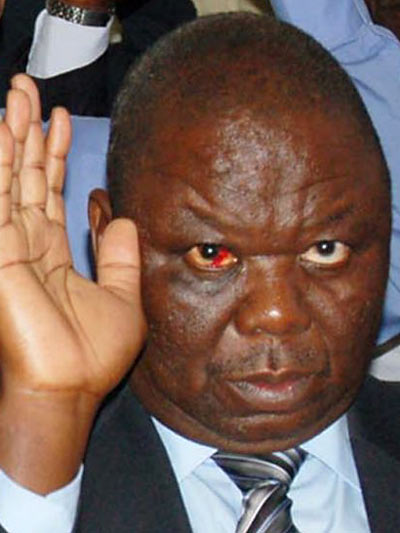Tsvangirai ministers boycott Zimbabwe cabinet in row with Mugabe
 Harare - Zimbabwean Prime Minister Morgan Tsvangirai's cabinet ministers launched a boycott of cabinet meetings Monday and said they were "disengaging" from the coalition government with President Robert Mugabe created earlier this year.
Harare - Zimbabwean Prime Minister Morgan Tsvangirai's cabinet ministers launched a boycott of cabinet meetings Monday and said they were "disengaging" from the coalition government with President Robert Mugabe created earlier this year.
Deputy prime minister Thokozani Khupe announced the move after Mugabe, apparently due to leave the country on Tuesday for a trip abroad, rescheduled Tuesday's regular cabinet meeting to Monday - apparently in order to avoid Tsvangirai chairing it.
Khupe said Mugabe and his Zanu-PF party were "dishonest and unreliable" partners.
Tsvangirai and Mugabe formed a power-sharing government in February, following a disputed presidential election and widespread violence.
Tsvangirai returned to Harare from a tour of donor countries shortly after midday.
Tsvangirai's return meant, said Khupe, that Tsvangirai would have chaired the meeting of the country's most powerful body on Tuesday for the first time since he and Mugabe established a power-sharing transitional government in February.
Khupe said they had boycotted the meeting because Mugabe was "seeking to deny recognition of the prime minister" as an equal partner. "It reflects disrespect and contempt," she said.
She would not say how long the "disengagement" would continue for, but said the MDC, which won parliamentary and the first round of presidential elections last year, was expressing its "constitutional right" to disengage, although the party remained committed to the coalition agreement they signed in September.
"It's time insanity and toxicity were removed" from the coalition government, she said. "For a long time we have remained the polite and subservient upholders of the ... agreement, against clear evidence of the absence of a reliable and honest partner."
Khupe cited the lack of progress on issues like Mugabe's unilateral appointments of his colleagues to top posts and renewed arrests and violence against MDC parliamentarians and white farm invasions.
Zanu-PF also continued to frustrate the agreement's commitment to establishing democracy, and "aborted" attempts to end the country's repressive media controls. "There is no movement on the fundamental issues of the promotion of freedom of assembly of speech and expression."
Observers say the ministers' action is an expression of their suppressed anger over what is widely seen as the determination of Mugabe, who has been in power for 29 years, to block attempts at democratic reforms that might weaken his grip on power.
At the weekend, the MDC held meetings to mark the anniversary of the bloody second-round presidential election campaign that ended with Mugabe's win of a one-person race after Tsvangirai withdrew over the murder of about 200 MDC supporters. (dpa)